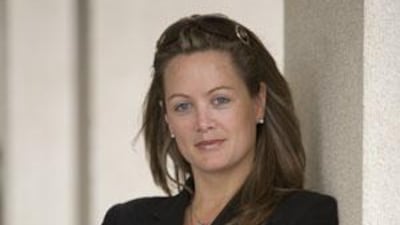ABU DHABI // Not long ago Hannah Dodkin was a plumber in London and if you had asked her then where Abu Dhabi was she would not have been certain. Today she is an executive at one of this country's biggest property firms after having been declared a joint winner last week of one of the Arab world's first reality TV shows. Ms Dodkin, 30, was one of 16 hopefuls on Hydra Executives, competing for the prize of a business investment worth US$1 million (Dh3.67m) from Dr Sulaiman al Fahim, the chief executive of the Hydra property empire.
Despite having been "fired" from the show in week nine, Ms Dodkin, from Somerset in the UK, was brought back to the final in a dramatic twist to become a surprise co-winner with the American architect Richard Best. Today she and Mr Best are putting the prize money to use by setting up an eco-friendly interiors and architecture firm. Ms Dodkin could not have imagined how much her life would change after she applied to appear on the programme. She had moved on from plumbing and was working as an interior design assistant in Britain when a friend told her about the auditions. With a similar format to the hit UK and US shows The Apprentice, Hydra Executives pitted a team of Americans against Britons in a weekly task related to the property industry, such as designing a special-needs centre, after which a contestant from the losing team would be fired.
"I just wanted to refresh my life," Ms Dodkin said. "I wasn't sure where Abu Dhabi was, but I liked the sound of the show." Her immaculately tailored black business suit is in stark contrast to the overalls she donned for her years as a plumber. "What I was open to was a new opportunity and I think I invited it without realising the potential of how it would change my life." She said there was never a question of returning to the UK, whether she lasted on the show or not. "I'd packed my bags and left. I just thought, why don't I live beside a beach with glorious sunshine every day?"
Even before she left the programme she had lobbied for an interview with Hydra. When Dr al Fahim fired her from the show, he was blunt. "She disappointed me and she disappointed her team as well. She can't make it in Hydra," he said. But Ms Dodkin is used to proving her critics wrong and landed not only an interview, but also a job. A year on she is indeed "making it" in Hydra, as a commercial officer.
Ms Dodkin said her experience as a plumber gave her the steely ambition she exudes today. "I was surrounded by men. There are very, very few female plumbers in the UK, very few in the world. When you start as an apprentice, male or female, you are always the young one on site and everybody will give you a tough time to test your ability, but for me that continued. "People would want to see my work and see what I was capable of, but fortunately I was pretty good at plumbing. If anything, in the end the guys felt a bit threatened."
It was that determination and the way she demonstrated her loyalty to the company that persuaded producers to bring her back to the programme as a wild-card in the final, she said. "Loyalty is essential here. They gave me the chance to prove myself." Her task was to negotiate her way back into the show by striking a deal with one of the finalists and she teamed up with Mr Best. "We managed to combine his business plan with mine and we won. I was absolutely thrilled." The pair are now setting up their company.
Ms Dodkin will be a silent partner for the first 12 months or so as she continues her work at Hydra, but her ambitions do not end there. "I've got ideas to do other things myself and I'm currently looking for investors to finance those projects." "I've got several business ideas that feed into the same main one," she said. "It's early days." lmorris@thenational.ae * Additional reporting by Charlie Hamilton

